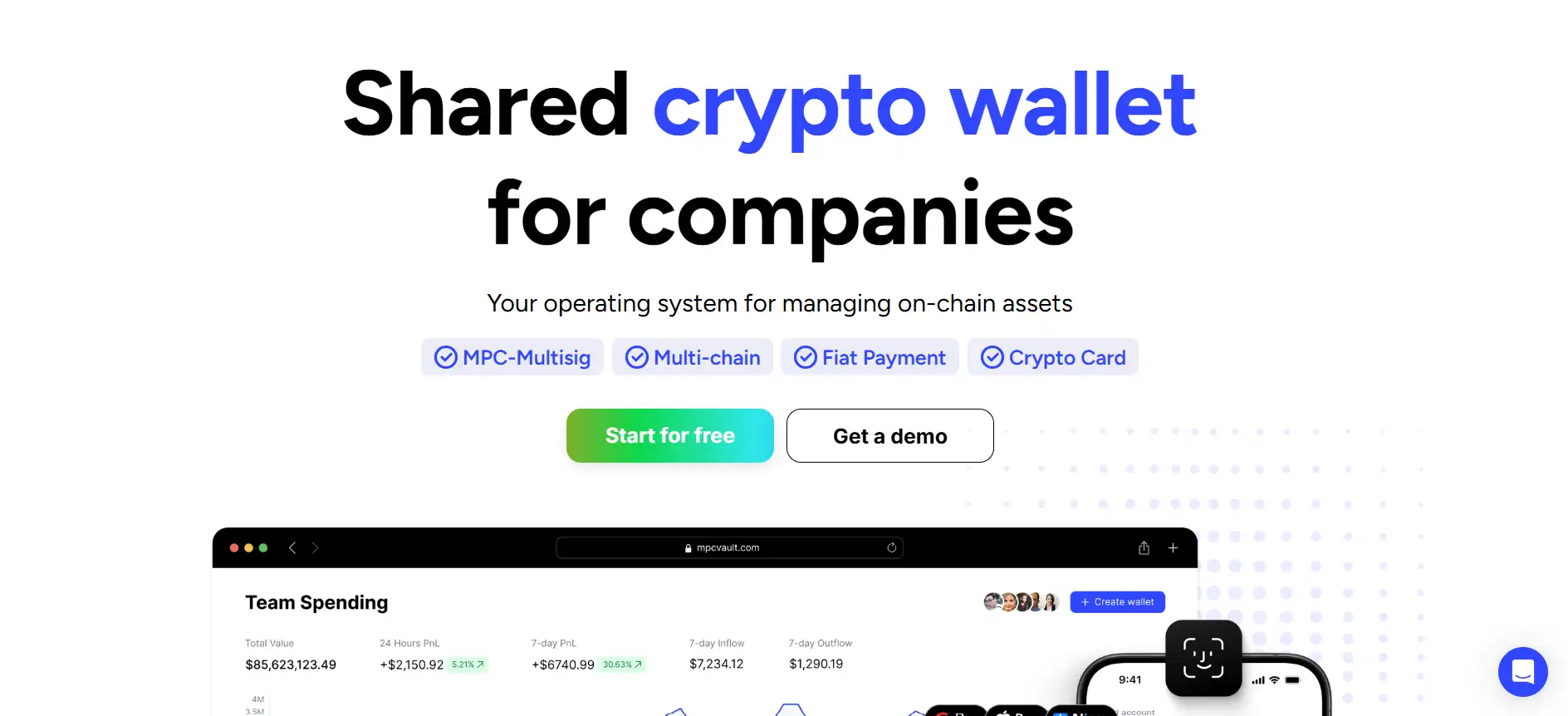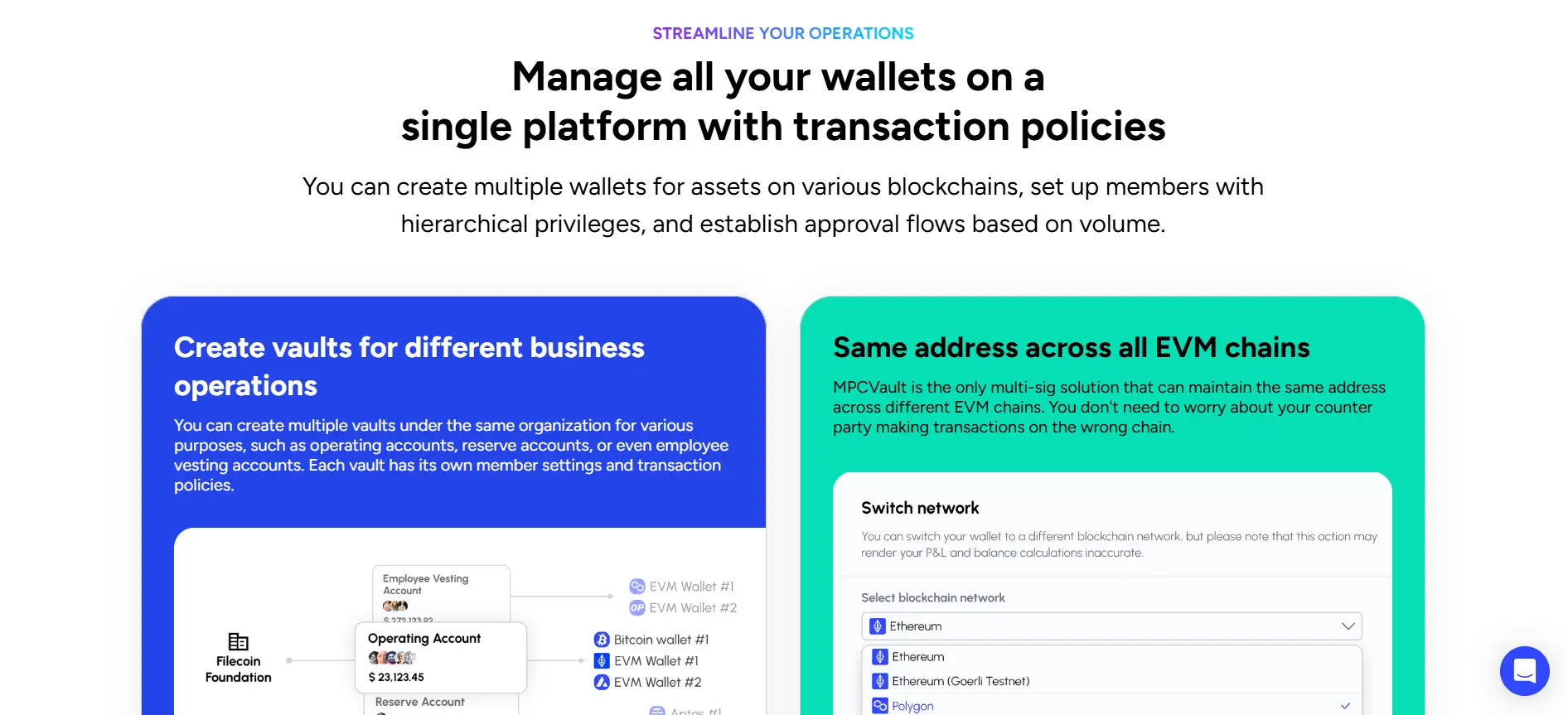About MPCVault
MPCVault is a robust, self-custodial, multi-sig crypto wallet infrastructure designed for enterprise-grade digital asset management. Built with advanced MPC cryptography, MPCVault empowers teams and institutions to manage crypto assets securely across multiple chains without relying on a centralized custodian.
Whether you're handling payrolls, on-chain treasury, or Web3 logins, MPCVault provides the tools needed to streamline operations, manage risk, and maintain full control over your keys and data. Its integrations with APIs, multi-cloud environments, and advanced governance make it the backbone for secure Web3 finance.
MPCVault offers an all-in-one solution to simplify the complexities of institutional digital asset custody. As a non-custodial wallet built for organizations, it combines multi-chain compatibility, multi-signature approval flows, and developer-first APIs to ensure secure and compliant crypto management. From Bitcoin to Solana, Ethereum, and TRON, MPCVault supports assets across leading blockchain ecosystems.
With features like batch transaction execution for payrolls and airdrops, reconciliation-ready transaction history exports, and dynamic access control policies, MPCVault provides an unparalleled toolkit for crypto treasury management. Organizations can define policies that respond to transaction volumes or destination addresses, ensuring that no operation bypasses security thresholds.
Security is at the heart of MPCVault's architecture. It uses Trusted Execution Environments (Intel SGX & AMD SEV) to isolate key computation processes, employs end-to-end encryption with public key pinning, and features periodic key refresh—all while maintaining self-custody. In case of compromise, users’ assets remain safe due to the distributed nature of key generation.
MPCVault also introduces a corporate crypto card that allows users to spend stablecoins like USDC globally at over 90 million merchants, complete with real-time alerts and automated expense tracking. With full support for API integrations, it's built for developers too—with SDKs in Go, Java, .NET, and iOS.
The platform is trusted by hundreds of institutions, including hedge funds, trading desks, exchanges, and DAOs, for its ability to handle everything from token vesting to high-frequency trading with complete transparency and security. MPCVault is the future of enterprise crypto operations.
MPCVault provides numerous benefits and features that make it a standout platform in the crypto custody space:
- Advanced MPC Architecture: Eliminate single points of failure with multi-party computation that ensures key security without ever forming a full private key.
- Self-Custody Model: Even in the event of a full platform compromise, users retain control of their digital assets.
- Multi-Chain, Multi-Asset Support: Compatible with all EVM chains and major non-EVM networks like Bitcoin, Solana, Aptos, and more.
- Smart Transaction Policies: Set approval flows based on volume, contract type, or destination to ensure safe and compliant operations.
- Developer-Friendly APIs: gRPC & REST APIs with SDKs for multiple languages, IP whitelisting, TLS enforcement, and custom access controls.
- Real-Time Security Tools: Features like transaction simulation, parameter decoding, and audit trails help prevent accidental or malicious transactions.
- Crypto Cards & On-Ramps: Spend crypto in the real world via the MPCVault Card, and convert fiat seamlessly.
MPCVault is designed to be user-friendly while offering institutional-grade capabilities. Here’s how to get started:
- Step 1 – Sign Up: Head to mpcvault.com and sign up for a free account or request a demo.
- Step 2 – Create Vaults: Set up dedicated vaults for operations, reserves, payroll, or treasury management—each with unique settings.
- Step 3 – Define Policies: Assign team roles, multisig rules, and transaction thresholds using the advanced policy engine.
- Step 4 – Connect Assets: Deposit assets from supported blockchains and monitor all balances in one unified interface.
- Step 5 – Enable Integrations: Use APIs or extensions to connect wallets to dApps, exchanges, or internal systems.
- Step 6 – Start Transacting: Execute batch payments, deploy contracts, or spend via crypto card—all while staying secure.
MPCVault FAQ
MPCVault uses a multi-party computation (MPC) approach that ensures your private key is never assembled in one place. Each key is split into shares across different devices, including one stored on your phone. Even if the platform is compromised, MPCVault does not have full control of your keys, keeping your assets safe.
Yes, MPCVault is built for enterprise operations. It supports batch processing of payments for up to 254 recipients per transaction, with tools for automating payroll, airdrops, and multi-vault finance workflows—all from a single dashboard. Learn more at MPCVault.
MPCVault is a self-custodial platform. Unlike custodial wallets, you retain full control over your assets. It uses end-to-end encryption, multi-cloud architecture, and Trusted Execution Environments (TEE) to ensure secure operations. Visit MPCVault for details.
Absolutely. MPCVault provides gRPC and REST APIs with extensive SDK support. Whether you're building internal tools or third-party integrations, the platform offers flexible abstractions, IP whitelisting, and callback security features. Explore the docs at MPCVault.
Yes. With the MPCVault Card, users can spend USDC and other crypto directly at over 90 million merchants globally. Real-time notifications and automated expense tracking make it ideal for business teams. Sign up at MPCVault.
You Might Also Like












